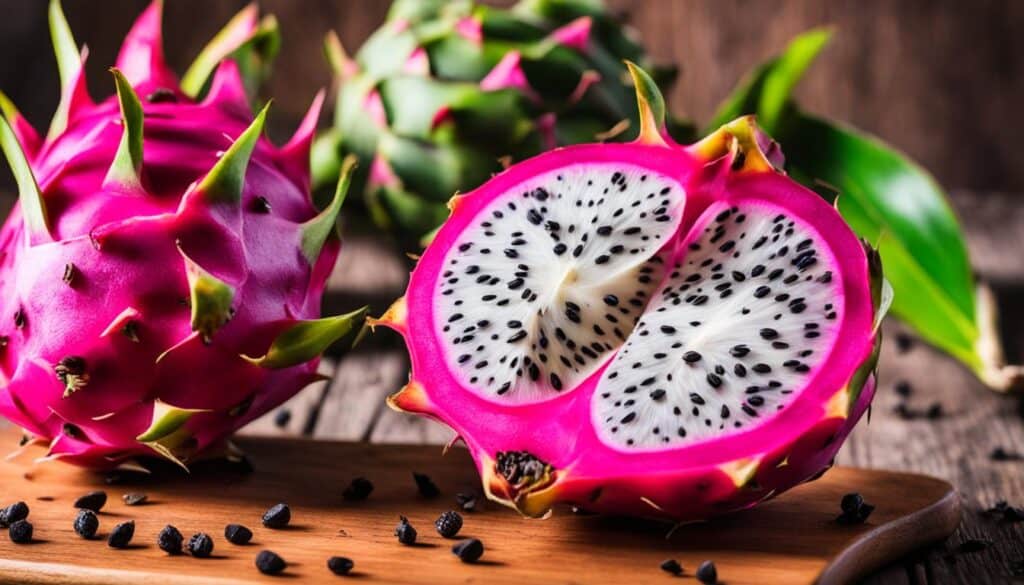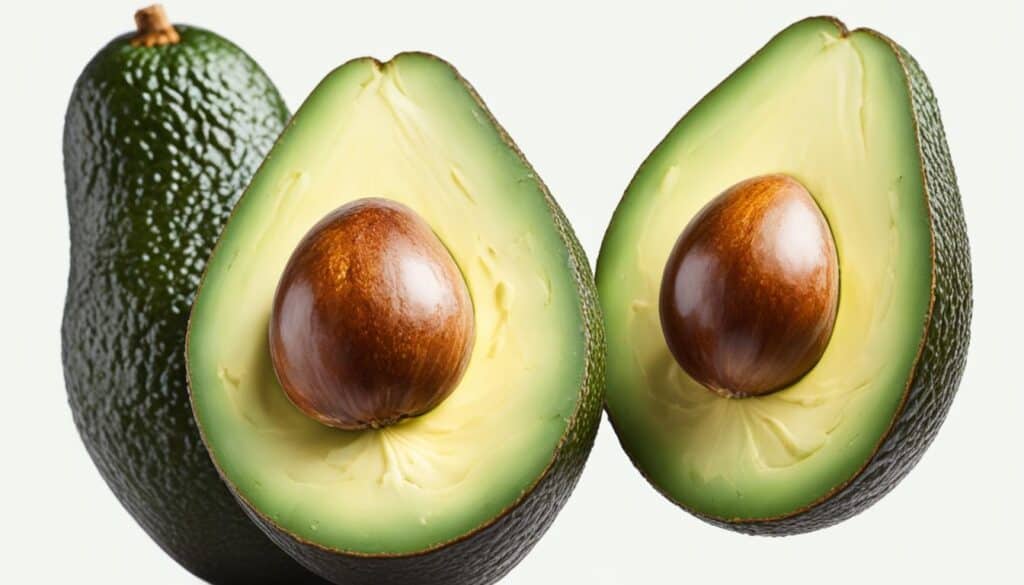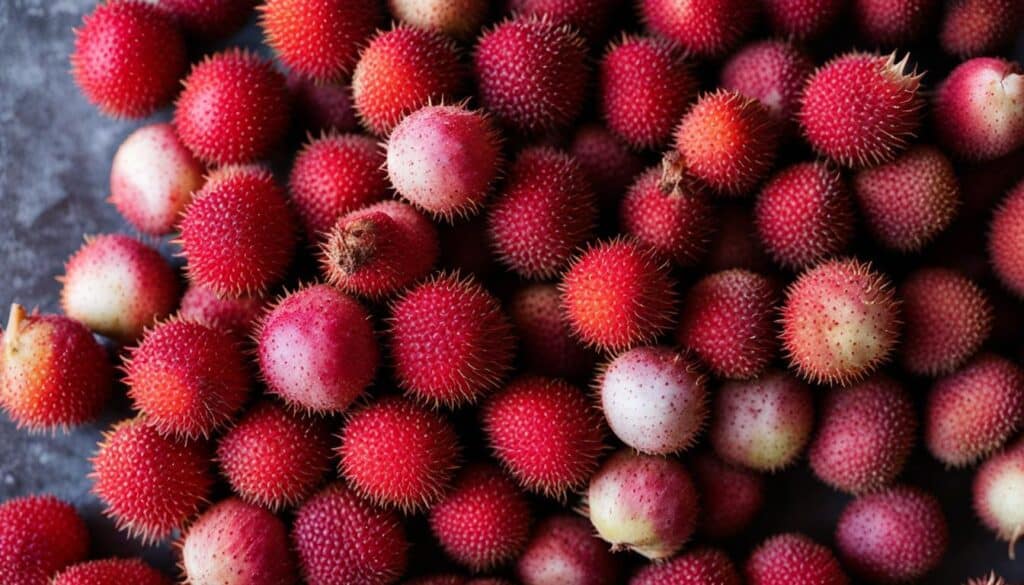When it comes to fruits, not only are they good for you, but they also offer a burst of deliciousness in every bite. There’s something undeniably enticing about the taste of a perfectly ripe fruit that’s juicy, sweet, and full of flavor. If you’re a fruit lover like me, you’re in for a treat because I’ve done the research and found the most tasty fruit in the world, along with a selection of other delicious and exotic fruits that are sure to make your taste buds dance with delight.
Key Takeaways:
- Discover the most tasty fruit in the world and satisfy your cravings for deliciousness.
- Explore a selection of exotic fruits that will take your taste buds on a culinary adventure.
- Learn about the health benefits of incorporating juicy and mouthwatering fruits into your diet.
- Indulge in the irresistible flavors and unique textures of these delightful fruits.
- Enhance your overall well-being by enjoying a variety of delectable fruits.
Apples – A Nutritional Powerhouse
When it comes to nutrition, apples are a true powerhouse. Not only are they delicious and satisfying, but they also offer a wide range of health benefits. From promoting good digestion to supporting heart health and blood sugar management, apples are truly remarkable fruits.
One of the key reasons why apples are so beneficial is their high fiber content. They contain both soluble and insoluble fiber, including important components like pectin, hemicellulose, and cellulose. Soluble fiber helps slow down the absorption of sugar into the bloodstream, making apples an excellent choice for maintaining stable blood sugar levels.
Moreover, the insoluble fiber in apples adds bulk to the stool, aiding in good digestion and promoting gut health. This fiber-rich fruit helps prevent constipation and keeps your digestive system running smoothly.
In addition to fiber, apples are a rich source of essential nutrients. They are particularly high in vitamin C, an antioxidant that plays a crucial role in supporting the immune system and protecting cells from damage. Vitamin C also promotes collagen formation, which is important for healthy skin, tissues, and blood vessels.
Apples are also packed with plant polyphenols, which are disease-fighting compounds that have been linked to a lower risk of heart disease, stroke, cancer, and neurological disorders. These powerful antioxidants help neutralize harmful free radicals in the body, reducing oxidative stress and inflammation.
To give you a better idea of the nutritional value of apples, here’s a breakdown of their key nutrients:
| Nutrient | Amount per 100g |
|---|---|
| Energy | 52 calories |
| Fiber | 2.4g |
| Vitamin C | 5.7mg |
| Plant Polyphenols | Various |
As you can see, apples are not only low in calories but also provide you with a good amount of fiber, vitamin C, and disease-fighting plant polyphenols.
So why wait? Grab an apple today and enjoy its delicious taste while reaping its numerous nutritional benefits.
Blueberries – Antioxidant Powerhouses
Blueberries are well known for their antioxidant and anti-inflammatory properties. These tiny berries pack a powerful nutritional punch, making them a must-add to your diet.
One of the key compounds responsible for the health benefits of blueberries is anthocyanin. Anthocyanin is a plant pigment and flavonoid that gives blueberries their vibrant blue color. It is also what makes blueberries such potent defenders against cell-damaging free radicals.
Blueberries are rich in anthocyanins, which are antioxidants that help protect your body from oxidative stress. These compounds fight against harmful free radicals and reduce inflammation in the body, providing numerous health benefits.
Studies have shown that a diet high in anthocyanins, such as those found in blueberries, can significantly reduce the risk of several chronic diseases. For instance, regular consumption of blueberries has been linked to a lower risk of type 2 diabetes, heart disease, high blood pressure, and certain types of cancer.
By incorporating blueberries into your daily diet, you can support heart health, manage blood pressure, and improve blood sugar control. The antioxidants in blueberries may also help protect against cognitive decline, promoting brain health as you age.
In addition to their antioxidant properties, blueberries are also a great source of other essential nutrients. They contain vitamins C and K, manganese, and fiber, which are all important for overall health and wellness.
To reap the benefits of blueberries, consider adding them to your breakfast smoothies, oatmeal, or yogurt. You can also enjoy them as a vibrant and refreshing snack on their own. With their delicious taste and impressive health benefits, blueberries are a delicious and nutritious addition to any meal plan.
Bananas – More Than Just Potassium
When it comes to bananas, many people immediately think of their high potassium content. While it’s true that bananas are a great source of potassium, there’s much more to these versatile fruits than meets the eye.
In addition to potassium, bananas also contain important vitamins and minerals that support overall health. They are a good source of:
- Vitamin B6: Essential for brain development and function, as well as the production of red blood cells.
- Vitamin C: An antioxidant that strengthens the immune system and helps the body absorb iron.
- Magnesium: Important for nerve function, muscle contraction, and maintaining a healthy immune system.
- Polyphenols: Compounds with antioxidant properties that may help protect against chronic diseases.
- Phytosterols: Plant compounds that can help lower cholesterol levels.
- Prebiotics: Substances that promote the growth of beneficial gut bacteria, supporting digestive health.
But that’s not all. The nutritional composition of bananas changes as they ripen. Green, unripe bananas contain higher amounts of resistant starch and dietary fiber. These substances are linked to improved blood sugar control and better digestive health.

Did You Know? Ripe bananas are an excellent source of easily digestible carbohydrates, making them a great choice for pre-workout fuel.
So, whether you enjoy bananas as a convenient on-the-go snack or use them as an ingredient in a tasty smoothie, you can feel confident knowing that you’re getting an array of beneficial nutrients. Bananas are not just potassium powerhouses; they are a wholesome addition to a balanced diet.
Oranges – Bursting with Vitamin C
Oranges are known for their high vitamin C content, providing 91% of the DV in a single fruit. They are also high in potassium, folate, thiamine (vitamin B1), fiber, and plant polyphenols. Consuming whole oranges has been found to lower levels of inflammation, blood pressure, cholesterol, and post-meal blood sugar.

Key Nutrients in Oranges:
- Vitamin C: Oranges are packed with vitamin C, an essential nutrient that supports immune function and acts as a powerful antioxidant.
- Potassium: Oranges are a good source of potassium, a mineral that plays a crucial role in heart health and regulates blood pressure.
- Folate: Oranges contain folate, a B-vitamin that is important for cell growth and development, especially during pregnancy.
- Thiamine (Vitamin B1): Oranges provide thiamine, which is involved in energy metabolism and helps maintain a healthy nervous system.
- Fiber: Oranges are a good source of dietary fiber, which aids digestion and promotes feelings of fullness.
- Plant Polyphenols: Oranges contain plant polyphenols, which have antioxidant and anti-inflammatory properties, and may help protect against chronic diseases.
“Oranges are not only delicious but also a nutritional powerhouse. They are packed with vitamin C, potassium, and fiber, making them a fantastic choice for supporting overall health and well-being.” – Nutritionist Sarah Johnson
Regularly consuming oranges as part of a balanced diet can have numerous health benefits. Here are some of the ways oranges can positively impact your health:
Inflammation and Blood Pressure:
The plant polyphenols found in oranges have anti-inflammatory properties that can help reduce inflammation in the body. Furthermore, the high potassium content in oranges supports healthy blood pressure levels.
Cholesterol and Heart Health:
The soluble fiber in oranges can help lower LDL (bad) cholesterol levels, reducing the risk of heart disease. The combination of fiber and plant polyphenols in oranges may also contribute to overall heart health.
Post-Meal Blood Sugar:
Oranges have a low glycemic index and contain fiber, which can help regulate blood sugar levels. Consuming oranges as part of a meal or snack can help minimize spikes in blood sugar after eating.
Make the most of oranges by consuming them fresh, or incorporate them into your diet in creative ways. Enjoy a refreshing glass of orange juice, add sliced oranges to salads, or squeeze fresh orange juice over grilled chicken for a burst of flavor. No matter how you choose to enjoy them, oranges are a delicious and nutritious addition to a healthy eating plan.
Dragon Fruit – Exotic and Nutrient-Rich
When it comes to exotic fruits, dragon fruit, also known as pitaya or pitahaya, is a true gem. This tropical fruit not only captivates with its vibrant appearance, but it is also a powerhouse of nutrients that can benefit your health in numerous ways.
One of the key attributes of dragon fruit is its high fiber content. Fiber plays a crucial role in maintaining a healthy digestive system and promoting regular bowel movements. Incorporating dragon fruit into your diet can help support a well-functioning digestive system and prevent constipation.
In addition to fiber, dragon fruit is a rich source of essential minerals like iron and magnesium. Iron is important for transporting oxygen throughout your body and maintaining healthy blood cells, while magnesium plays a vital role in numerous bodily functions, including nerve and muscle function.
Dragon fruit is also packed with vitamins C and E, two powerful antioxidants that are known for their immune-boosting properties and ability to protect against cellular damage caused by harmful free radicals. These vitamins are essential for supporting overall health and well-being.
Another unique aspect of dragon fruit is its abundance of carotenoids, including lycopene and beta carotene. Carotenoids are pigments found in plants that have been linked to various health benefits, such as reducing the risk of chronic diseases and promoting eye health.
It’s worth noting that dragon fruit holds a special place in Southeast Asian cultures, where it has been used for centuries due to its health-promoting properties. Its popularity has now spread worldwide, making it a sought-after fruit for both its taste and nutritional benefits.

Dragon fruit is a true nutritional powerhouse, offering a combination of fiber, iron, magnesium, vitamins C and E, and carotenoids. Including this exotic fruit in your diet can provide a range of health benefits, from supporting digestion to boosting the immune system. Don’t miss out on this tropical delight!
Mango – The King of Fruits
Mangoes, often referred to as the “king of fruits,” are packed with nutrients. They are an excellent source of potassium, folate, fiber, and vitamins A, C, B6, E, and K. Mangoes are also rich in mangiferin, a potent antioxidant that has been shown to protect against chronic diseases like type 2 diabetes, heart disease, Alzheimer’s, Parkinson’s, and certain forms of cancer.
Additionally, mangoes contain fiber, which supports regular bowel movements and aids digestive health.
Critical Nutrients in Mangoes
Mangoes are a nutritional powerhouse, providing a wide range of essential vitamins and minerals. Here are some key nutrients found in mangoes:
| Nutrient | Benefits |
|---|---|
| Potassium | Supports heart health and helps maintain healthy blood pressure levels. |
| Folate | Essential for cell growth and development, especially during pregnancy. |
| Fiber | Promotes healthy digestion and aids in maintaining a healthy weight. |
| Vitamins A, C, B6, E, K | Offer a range of benefits, such as supporting immune function, promoting healthy skin, improving vision, and protecting against oxidative stress. |
| Mangiferin (Antioxidant) | Helps reduce inflammation and protects against chronic diseases. |
Including mangoes in your diet can be a delicious way to ensure you’re getting these vital nutrients and enjoying the numerous health benefits they offer.
Avocado – A Healthy Fat Source
Avocados are unique among fruits as they are high in healthy fats and low in natural sugars. They are mainly composed of oleic acid, a monounsaturated fat that is linked to better heart health. Avocados also contain potassium, fiber, vitamin B6, folate, vitamins E and K, lutein, and zeaxanthin, which support eye health. Studies have shown that consuming avocados can decrease cholesterol levels and promote weight management.
| Nutrient | Amount per 100g |
|---|---|
| Healthy Fats | 14.7g |
| Potassium | 485mg |
| Fiber | 6.7g |
| Vitamin B6 | 0.4mg |
| Folate | 81mcg |
| Vitamin E | 2.1mg |
| Vitamin K | 21mcg |
| Lutein | 1600mcg |
| Zeaxanthin | 39mcg |
Avocados are not only delicious but also packed with essential nutrients. Their healthy fat content makes them a great addition to a balanced diet. The potassium in avocados helps regulate blood pressure and promotes heart health. The fiber content aids in digestion and supports weight management by providing a feeling of fullness. Additionally, avocados contain important vitamins and antioxidants that promote eye health, such as vitamins E and K, lutein, and zeaxanthin. Incorporating avocados into your meals can have numerous benefits for your overall well-being.

Lychee – A Nutrient-Rich Delicacy
Lychee, also known as litchi or Chinese cherry, is a fruit rich in nutrients. It is a good source of vitamin C, potassium, fiber, and polyphenols with anti-inflammatory and antioxidant properties. Lychee contains various beneficial plant compounds such as gallic acid, chlorogenic acid, catechins, and caffeine. This fruit has been treasured in Southeast Asian cultures for its health benefits.

Southeast Asia is known for its tropical climate, and it’s no wonder that lychee thrives in this region. The sweet and juicy taste of lychee makes it a popular fruit choice, not only for its flavor but also for its nutritional value.
Lychee is a great source of vitamin C, which is essential for a healthy immune system and helps protect the body against infections and diseases. It also plays a key role in collagen production, promoting healthy skin and joints.
In addition to vitamin C, lychee is rich in potassium, a mineral that helps regulate blood pressure, maintain heart health, and support proper muscle and nerve function. Potassium is also important for balancing fluids in the body, which is crucial for overall hydration.
Lychee is also a good source of fiber, which aids in digestion and helps prevent constipation. Fiber is known to support a healthy gut and may also contribute to weight management by promoting feelings of fullness.
The polyphenols found in lychee, such as gallic acid, chlorogenic acid, and catechins, have been shown to have anti-inflammatory and antioxidant properties. These compounds help protect the body against oxidative stress, reduce inflammation, and may even have anti-cancer effects.
“Lychee is like a burst of flavor in every bite. Its unique combination of sweetness and tartness is truly refreshing.”
Whether enjoyed on its own, added to fruit salads, or incorporated into desserts and beverages, lychee offers both a delicious and nutritious option. Its vibrant red color and juicy flesh make it a visually appealing fruit, perfect for adding a pop of color to any dish.
| Nutrients | Amount per 100g |
|---|---|
| Vitamin C | 71.5mg |
| Potassium | 171mg |
| Fiber | 1.3g |
| Polyphenols | Various |
The table above showcases the key nutrients found in lychee. With its vitamin C content, lychee provides a significant portion of the recommended daily intake. It is also a good source of potassium and contains fiber and beneficial polyphenols.
Enjoying Lychee
There are many ways to enjoy lychee. Here are a few ideas:
- Eat it fresh: Peel the skin and enjoy the juicy flesh of the lychee fruit.
- Add it to salads: Lychee can be a delicious addition to fruit salads, providing a burst of sweetness.
- Make a refreshing drink: Blend lychee with ice, water, and a touch of sweetener for a refreshing beverage.
- Incorporate it into desserts: Lychee pairs well with desserts like sorbets, tarts, and gelato.
Whether you savor the taste of lychee on its own or get creative with recipes, this nutrient-rich fruit is sure to delight your taste buds.
Conclusion
In conclusion, there is an abundance of delicious and nutritious fruits to choose from, each offering its own unique set of nutrients and health benefits. While personal preference may vary, the search for the most tasty fruit in the world can be an exciting journey filled with flavorful discoveries.
Whether you’re drawn to the crispy sweetness of apples, the antioxidant power of blueberries, or the tropical allure of mangoes and dragon fruit, incorporating a variety of fruits into your diet is a surefire way to enhance your overall health and satisfy your taste buds.
So don’t hesitate to indulge in the irresistible flavors of these mouthwatering fruits. From apples to bananas, oranges to lychees, the choices are endless, and the benefits are immense. Remember, the world’s most tasty fruit is ultimately a matter of personal preference, but the best conclusion is to enjoy the array of nutritious and delicious fruits that nature has to offer.
FAQ
What makes apples a nutritional powerhouse?
Apples are rich in soluble and insoluble fiber, such as pectin, hemicellulose, and cellulose, which help with blood sugar management, promote good digestion, and support gut and heart health. Apples are also a good source of vitamin C and plant polyphenols, which have been linked to a lower risk of heart disease, stroke, cancer, overweight, obesity, and neurological disorders.
What are the health benefits of blueberries?
Blueberries are high in anthocyanin, a plant pigment and flavonoid, which helps fight cell-damaging free radicals and offers numerous health benefits. Studies have shown that a diet high in anthocyanins, such as those found in blueberries, can reduce the risk of type 2 diabetes, heart disease, high blood pressure, certain types of cancer, and cognitive decline.
What nutritional benefits do bananas offer?
Bananas are a good source of vitamins B6 and C, magnesium, polyphenols, phytosterols, and prebiotics, which support overall health. Green, unripe bananas are high in resistant starch and dietary fiber, linked to improved blood sugar control and better digestive health. Ripe bananas are an excellent source of easily digested carbs, making them great for pre-workout fuel.
What makes oranges bursting with vitamin C?
Oranges are known for their high vitamin C content, providing 91% of the DV in a single fruit. They are also high in potassium, folate, thiamine (vitamin B1), fiber, and plant polyphenols. Consuming whole oranges has been found to lower levels of inflammation, blood pressure, cholesterol, and post-meal blood sugar.
What nutrients are found in dragon fruit?
Dragon fruit, also known as pitaya or pitahaya, is a tropical fruit rich in nutrients. It is a good source of fiber, iron, magnesium, vitamins C and E, and carotenoids like lycopene and beta carotene. Dragon fruit has been highly regarded in Southeast Asian cultures for its health-promoting properties.
What nutrients are found in mangoes?
Mangoes are an excellent source of potassium, folate, fiber, and vitamins A, C, B6, E, and K. Mangoes are also rich in mangiferin, a potent antioxidant that has been shown to protect against chronic diseases like type 2 diabetes, heart disease, Alzheimer’s, Parkinson’s, and certain forms of cancer. Additionally, mangoes contain fiber, which supports regular bowel movements and aids digestive health.
What makes avocados a healthy fat source?
Avocados are unique among fruits as they are high in healthy fats and low in natural sugars. They are mainly composed of oleic acid, a monounsaturated fat that is linked to better heart health. Avocados also contain potassium, fiber, vitamin B6, folate, vitamins E and K, lutein, and zeaxanthin, which support eye health. Studies have shown that consuming avocados can decrease cholesterol levels and promote weight management.
What nutrients are found in lychee?
Lychee, also known as litchi or Chinese cherry, is a fruit rich in nutrients. It is a good source of vitamin C, potassium, fiber, and polyphenols with anti-inflammatory and antioxidant properties. Lychee contains various beneficial plant compounds such as gallic acid, chlorogenic acid, catechins, and caffeine. This fruit has been treasured in Southeast Asian cultures for its health benefits.





Leave a Reply